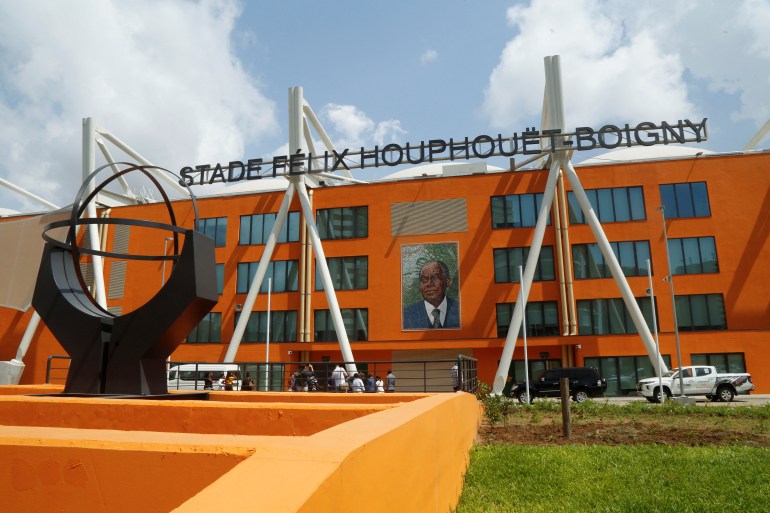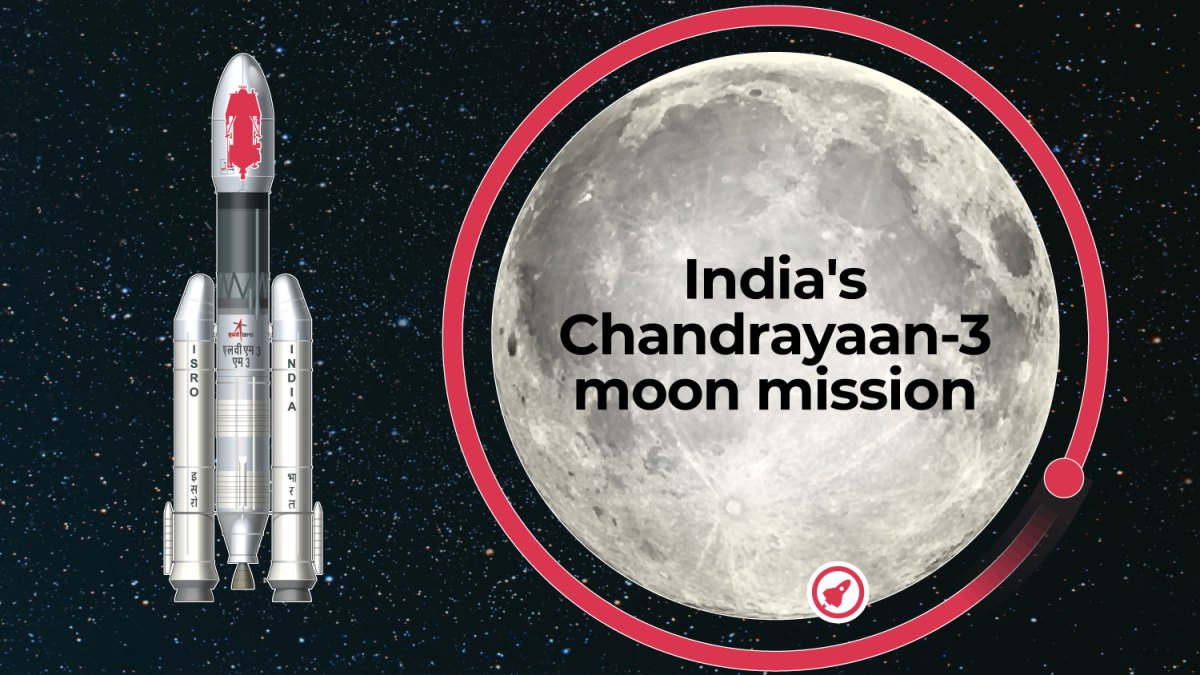Time to shine: Ivory Coast counts wins but not costs as AFCON 2023 begins
Abidjan, Ivory Coast – Cocktails being named after popular African footballers. Street merchants draped in samples of the orange-white-and-green Ivorian flags stacked for sale on their shoulders. Women decked in the jersey of Les Elephants, the senior men’s football team, dancing in the market. Wire designs of balls hung as overhead street decor alongside signs flanking the road from the airport into the Abidjan city centre. Big screens going up at large open-air beer parlours or maquis, across the nation.
On the eve of the 34th edition of the African Cup of Nations (AFCON), host country Ivory Coast is agog with anticipation. Nowhere is this more evident than in its commercial capital Abidjan, the economic powerhouse of Francophone Africa.
While the goals the 24 participating countries score during the footballing spectacle will likely elicit the loudest cheers, the tournament is also a source of patriotic joy for millions in this West African nation, where football has often been a tool for unity.
On several occasions, legendary striker Didier Drogba has used his stature as one of football’s greats and one of the most popular Africans alive, to call for lasting peace in his home country.
In October 2005, immediately after Les Elephants qualified for their first-ever appearance at the World Cup, Drogba, surrounded by his kneeling teammates pleaded with warring factions in the ongoing civil war, to lay down their arms. That wish was granted within a week.
Just over two years ago, the former Chelsea striker again called for peace in his country following unrest that caused the deaths of nearly 100 people after President Alassane Ouattara – whose 2010 win triggered the second civil war – secured a controversial third term in office in November 2020.
“We are happy we can host Africa today,” says Brice Kouame, a patron at Blockosso, a lagoonside agglomeration of maquis in northern Abidjan, while sipping a Beaufort, a local beer. Having skipped the 2017 Francophone Games in the city, the last major sporting event the country hosted, the 27-year-old can’t wait for proceedings to begin on Saturday.
Construction and controversy
President Ouattara alluded to the potential reconciliatory role of hosting the Nations Cup for a second time – the other time was in 1984 – when he told the nation during his New Year’s address: “We must show our ability to unite, to make our country shine.”
His government has been busy ahead of the tournament.
In addition to a new shiny $260m, 60,000 capacity stadium on the outskirts of Abidjan named after Ouattara, several stadiums have been built or upgraded across four other cities: the capital Yamoussoukro, Korhogo to the north, the central hub of Bouake and dreamy coastal San Pedro near the Liberian border.
Two new bridges crossing the Ebrie Lagoon in Abidjan have been commissioned in the last seven months, to manage traffic in the city. Roads and hotels have also been upgraded.
The month-long event is expected to boost tourism in the Ivory Coast, especially from within the Economic Community of West African States (ECOWAS) which is home to 11 of the 24 participating teams. Fans are taking advantage of freedom of movement within the bloc to pour into the country to support their teams.
But the world’s largest cocoa producer spending an eye-popping $1bn to host Africa’s biggest sporting event when almost half of its 25 million people live on $1.2 or less a day, has led to criticism for the Ouattara administration’s priorities.
And there has been more controversy.
Last September, the new Abidjan stadium, the main venue, was flooded after a downpour. It cost Patrick Achi and and Paulin Danho their jobs as prime minister and sport minister respectively, and an unnamed amount to relay the pitch.
The initial construction of the stadium was financed by a $180m “gift” from the Chinese government as a gesture to celebrate 35 years of friendship between the two countries. It is the latest example of Beijing’s controversial “palace diplomacy” projects across Africa.

Dream or mirage?
Nevertheless, Yacine Idriss Diallo, president of the Ivory Coast Football Federation thinks the investment is for a worthy cause.
“This investment is not only for football but for the entire country. The roads will be used by the people of the country, the hospitals too and the stadiums will be used by sports teams,” enthused Diallo.
The new 20,000-seat stadium in San Pedro, named after legendary Ivorian striker Laurent Pokou, was finished not long after the road linking it to Abidjan was fixed, halving the arduous eight-hour road journey between both places. Consequently, San Pedro’s two top division teams Sewe Sport and San Pedro FC no longer have to go to Abidjan where they were forced to play their home games due to the absence of an adequate venue in their hometown.
Diallo, a former vice president of 29-time Ivorian league winners ASEC Mimosas, is also hopeful that the modern facilities – including four new training pitches in the host cities – will accelerate the development of the country’s next generation of talent.
“The academies are very important, and it is from there you can build good teams,” he says. “We are trying to improve this across the country because we have lots of players from areas outside Abidjan…our football [teams] will have nice infrastructure to play and Ivory Coast will become a hub for football in West Africa. Many countries will now come to play on our fields.”
Diallo highlights the emergence of Wilfried Singo and Simon Adingra from remote areas to star respectively with top French side Monaco and impressive Brighton who have lit up the English Premier League.
The 23-year-old Singo came from AS Denguele based in Odienne, about 700km north of Abidjan. Adingra, the 22-year-old midfielder who has made a big impression in his first season with the Seagulls after moving from Danish side Nordsjaelland, is from Bondouko.
“We need to go into country to provide opportunities to those young people to play and develop into top players,” says Diallo.
Like him, Paul Melly, consulting fellow with the Africa Programme at London-based think-tank Chatham House, believes the massive expenditure to host the tournament could be beneficial in the long term.
“The $1bn capital outlay is hefty and open to complaints the money could be better spent on basic public services,” he says. “But taking the long view, it could prove a shrewd investment: with host stadiums in five different cities the economic impact of the tournament will be spread around the country. Moreover, the Nations Cup will showcase [the Ivory Coast’s] potential as an emerging market and business services hub.”
Meanwhile, the International Monetary Fund (IMF) has forecast that the Ivorian economy, currently Africa’s 10th largest, will grow by a healthy 6.6 percent in 2024. This would place it among the top 10 best-performing economies in the world. Still, there are concerns about whether that can trickle down to the households most vulnerable to the soaring costs of living, nationwide.
Bright Simon, Research Lead at IMANI, an Accra-based pan-African think tank, highlights the experiences of previous tournament hosts who envisioned post-cup growth that barely came.
“Research shows that South Africa’s World Cup effort added about 0.5 percent to [gross domestic product] in 2010 but the aftermath has been economically disappointing,” he tells Al Jazeera. “Ghana saw the new stadia built for the 2008 Nations Cup deteriorate fairly rapidly and has still not found a means for them to pay for themselves.”
“Of course, infrastructure like roads, hotels and hospitals may fare better, but only if their design and siting are very strategic. In some cases, like we saw with Cameroon’s Nations Cup effort in 2022, there are no linkages to broader economic corridors, thus leading to underwhelming development outcomes,” Simon adds.

‘We will try to do our best’
While the cost-analysis debate continues, Ivorian authorities are excited about bringing to life an idea that Ouattara has had since 2014.
“Our country has come very far,” Diallo tells Al Jazeera. “Ten years ago it was tough here [because of the civil war], but now you see the country is quiet, there is peace and everybody is working hard to improve their lives. Hosting the tournament is very important for nation-building. During the Africa Cup of Nations, you will see the passion for the game in this country.”
The current feel-good factor among Ivorians about hosting the Nations Cup could be boosted by an above-average performance by the Serge Aurier-led Elephants, one of the favourites to win the competition.
However, while many Ivorians are hoping their team repeats the success of their predecessors of 1992 and 2015, even Diallo is careful not to get his hopes too high about the Elephants’ chances of lifting African football’s most coveted prize for a third time.
“Of course, it will be good for the tournament if our team does well … but we are building a new team,” he says. “Thirty percent of the team is very young. It will be their first major competition, so we will try to do our best to go as far as possible and try to win the trophy.”




